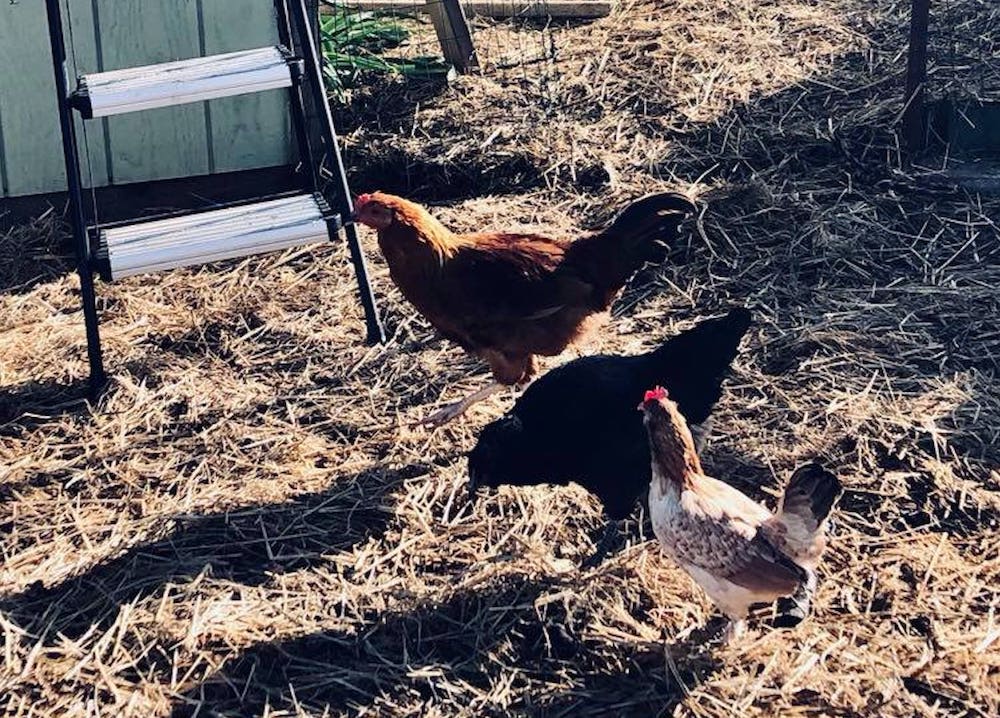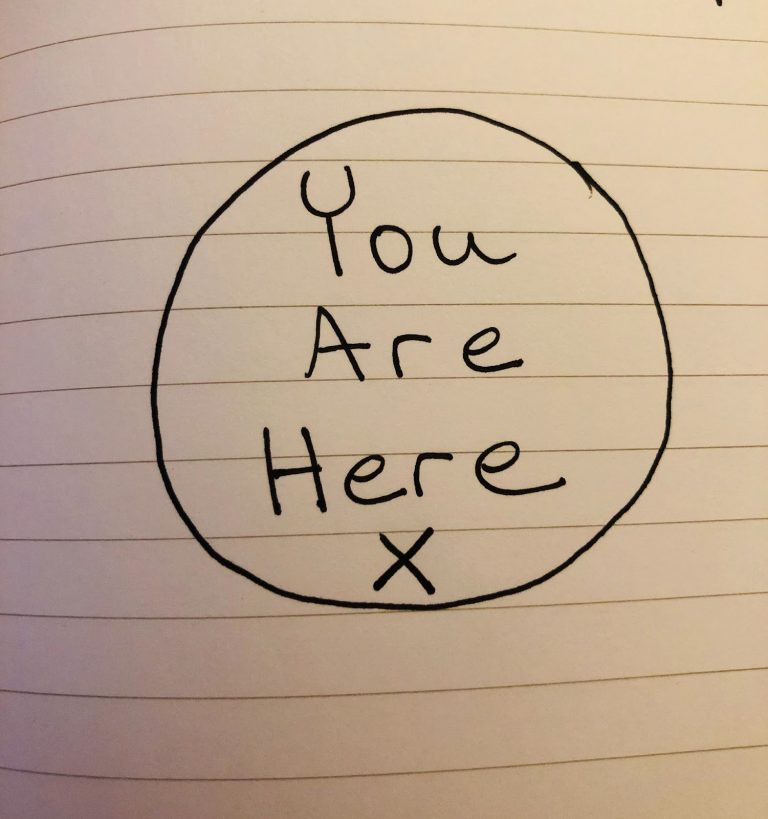by Laura Johnson, PhD

She and her sister were the smallest of seven chickens we added to our backyard flock this Covid-19 summer, bringing us to an even dozen. Orange and brown and gold and white, they were tiny little hens, less than two pounds each, a third of the size of my baby at birth. Their first evening in our backyard homestead, after their former owner said her goodbyes and headed off east from Humboldt County, the two bantam hens flew up into our elder cherry tree, fruit so recently fallen and branches lush with leaves, to roost.
One morning, after a somewhat sleepless night with our baby daughter, my husband and I realize one of the bantam hens is missing. We search in nooks and crannies, we query neighbors, we wait, but she doesn’t reappear.
There’s no evidence of violence on the ground, and in the branches, just a few golden feathers swaying in the breeze. We kick ourselves. Likely an aerial predator, folks say, an owl or a hawk. It happens, they say, you’ll get used to it if you keep chickens long enough.

The remaining bantam hen seems lost. Did she watch as her sister was taken? Is she hurt, traumatized, heartbroken? That evening she joins the other hens in the coop, never since returning to the branches of the cherry tree.
A few months later the winds bring smoke and ash from Northern California’s record-breaking wildfires to our door. One early fall morning we awake to orange skies and unbreathable air, to what feels like another planet, to climate loss and fear and fresh layers of grief. I lie in bed and hold my baby and try to take deep breaths. Later, while simmering eucalyptus on the stove top to soothe our congested lungs, I watch her smile and laugh as she plays, her face bathed in eerie golden light.
I worry about her future, wonder about our hard decision to have a child in these times. I worry about the chickens, outside and wheezy. I think of the countless beings displaced by and lost to the flames, of the places and plants and memories mingling in the ash, of all those struggling to breathe.
Soon after the bantam hen ‘goes broody;’ she won’t leave her nest box for days, having firmly decided to hatch her unfertilized egg. I mention it to an experienced chicken-raising friend, our doula, who drops by two fertile eggs from her own flock, and we slip them into her nest box beside her. She doesn’t appear to notice, but when I check back a few minutes later she’s sitting on them. For three weeks she remains; she barely moves.
One morning we check the coop and spy a tiny yellow fluff peeking out from beneath the bantam hen’s wing. She fluffs up when we come near, growing large and daring us to harm her baby, like any new parent would. We keep our distance. The next day a tiny black fluff has joined the yellow one, and we rejoice at the arrival.
I keep an eye on them throughout the day, bringing my baby out to see the chicks from afar. One time I find them pecking at their mother’s eyes, an attack she is thwarting as best she can. She seems tired and confused and alarmed, perhaps wondering what she’s gotten herself into. I watch with compassion, thinking of my own exhaustion, of painful moments and lowest points, of all the things lost, and gained.
A few days later the proud new mother and her babies emerge from the coop, meeting the sunlight and blue skies that have so graciously returned. The bantam hen keeps them close as she introduces them to the whole wide world, little bit by little bit. She shows them where to find food and water, where to find safety and shelter, where to rest in the warm sun. And I am watching with wonder as I too spend my days introducing my baby to the whole wide world, little bit by little bit.
One afternoon I hear the chickens squawking and know at once something isn’t right. From the kitchen window I see the hawk in the cherry tree. I run to them as fast as my legs will carry me; when I arrive the hawk is gone and the bantam hen is pacing furiously, crying out at the top of her lungs. The other chickens are distraught and the chicks are nowhere in sight; my heart pounding and breaking at once, I search and watch and wait.
A few minutes pass, the bantam hen slips beneath the coop, and I hold my breath. She emerges moments later, both chicks in tow. She’s shown them a hiding place, kept them safe from danger, protected them with ferocity. My relief is palpable, and I ponder how to protect my own child from all that would harm her; like this tiny, fierce mother hen, I want to shout a warning into the sky.
M y baby is growing fast, and the chicks are growing faster. The yellow chick’s feathers grow darker, now a reddish brown speckled with black, and within weeks both are bigger than their mother. The distance the bantam hen allows between them grows as her babies, now teenagers, wander farther and farther; her calls grow less insistent, and they are heeded less immediately. But when frightened they still dart quickly to their mother, and at bedtime the three still pile themselves into the tiny nest box to sleep.
And I am watching and thinking of my baby and the space that will grow between us, of the way she is already wandering farther from me, wondering whether she will still want to cuddle in bed when she’s as big or bigger than me.
I t is nearly winter now and I am planting a late garden of lettuce and arugula, spinach and beets, kale and broccoli. Nestling the seedlings in the soil, I tuck them in for the night to protect them from morning frost. Nearby the bantam hen is heading into the coop as night draws near, followed closely by her babies now nearly double her size, where she will nonetheless tuck them beneath her wing. My baby, who has just turned one, is nearing time for bed herself, and I will hold her close until she drifts off to sleep, imagining a world with care at the center.
And in the morning, we emerge to greet the sun.
Laura Johnson, PhD, is a critical cultural geographer, college lecturer, freelance writer, permaculturist, yoga teacher, and new mother. Her recent work has appeared in places like Tikkun, Taproot Magazine, the Journal of Wild Culture, Empty Mirror, Permaculture Women Magazine, Resilience.org, Good Grief Network, and LionsRoar.com. She lives in Eureka, CA, with her husband, baby daughter, dogs, cats, and chickens. Connect at www.laurabjohnson.com or www.flourish-homestead.com.




